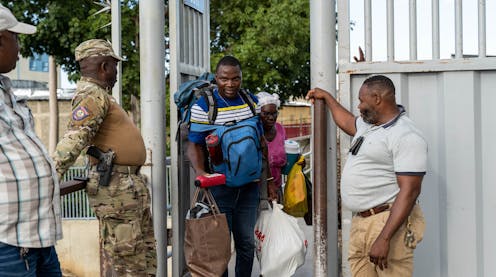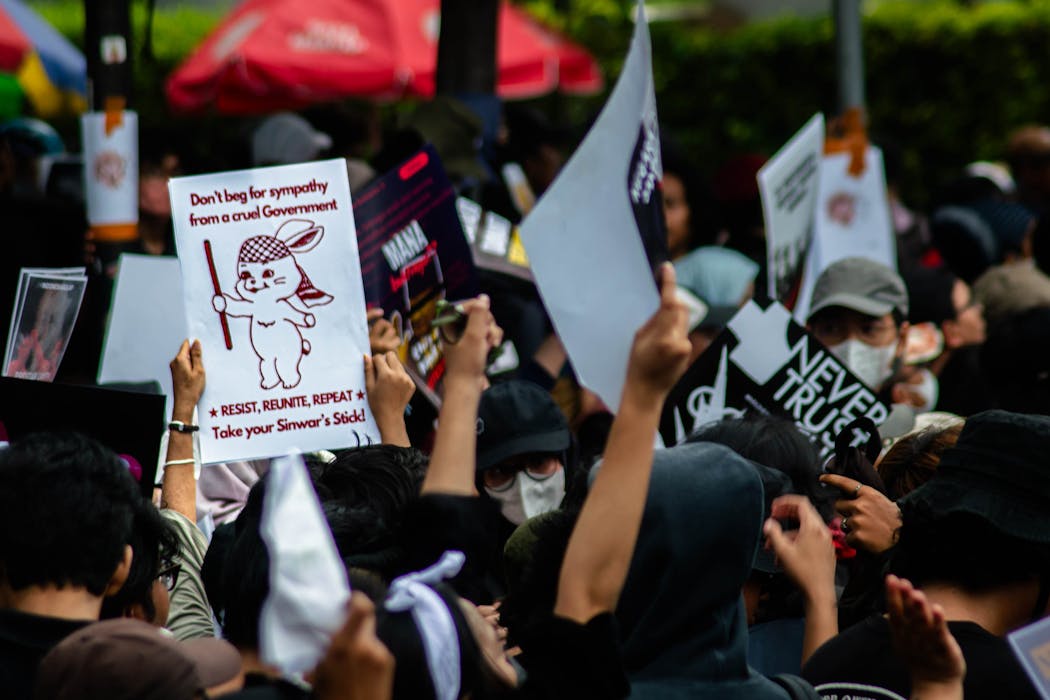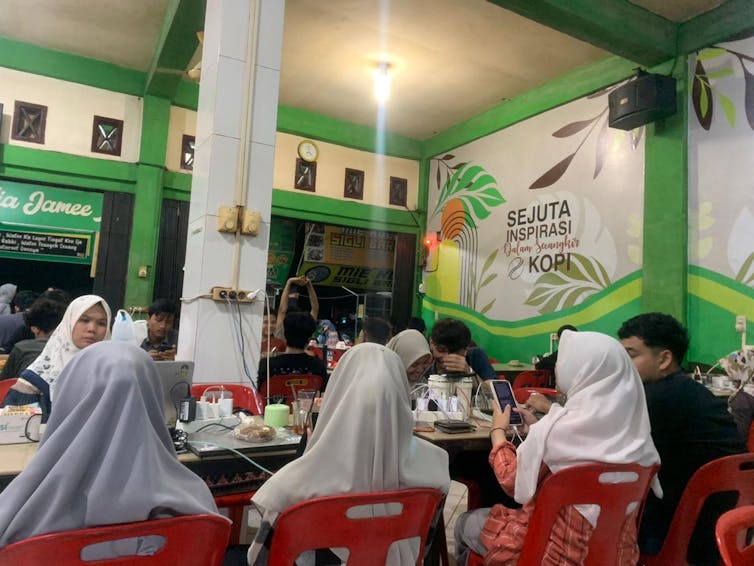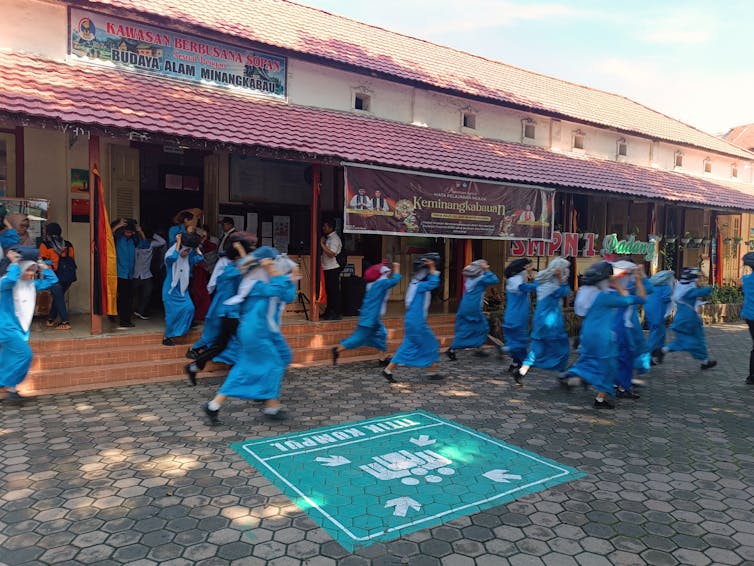Haitians looking to escape violence and chaos face hostility in neighboring Dominican Republic
- Written by Edlin Veras, Visiting Assistant Professor of Sociology and Black studies, Swarthmore College

Haiti’s capital of Port-au-Prince has been under siege for several months, with reports suggesting about 200 gangs[1] have seized control of more than 80% of the city[2].
The surge of violence has left residents with few options other than to shelter in their homes or seek refuge in other towns or countries.
But finding safety outside Haiti’s immediate borders isn’t easy. Recent actions by the U.S., one of the most common destinations[3] for Haitian migrants, have created additional challenges. Limits on flights in and out of the country[4], the suspension of visa services in Haiti[5] and a refusal to grant “temporary protected status” to Haitians arriving in the U.S. after November 2022[6], for example, have made it not only difficult but unlawful in most cases for Haitians to emigrate to the States.
With such restrictions, and with the Biden administration intent on sending Haitians intercepted en route to the U.S. back home[7], many are seeking instead[8] to migrate to the only country that shares a land border with Haiti: the Dominican Republic.
But as a scholar who studies the experiences of Haitians in the Dominican Republic[9], I know that their reception across the border is often contentious.
Anti-Haitian xenophobia
The chaos that has descended on Haiti in recent months has seen more than 360,000 people[10] being internally displaced. It has also led to a wave of xenophobia[11] in the Dominican Republic, where Haitians make up a sizable minority. In a country of about 11 million people[12], the estimate of how many Haitian migrants reside in the Dominican Republic ranges from 500,000[13] to 1 million[14]. Recent incidents of xenophobia have included harassment of Haitian migrants[15] such as extortion and reports of both physical and sexual assaults[16].
Anti-Haitian sentiment has also galvanized politicians advocating stronger border regulations[17] in an election year.
Dominican President Luis Abinader, who is currently leading in the polls[18] ahead of the May 19 general election, has made it clear that he seeks to continue[19] migration policies that include the building of a border wall[20] and the placement of strategic checkpoints to prevent[21] what his administration once described as an “avalanche of illegal foreigners, especially Haitian nationals[22].”
A not-so-friendly neighbor
Haitians have long been the target of mass deportations[23] and violence in the Dominican Republic. In 1937, dictator Rafael Trujillo ordered the mass killing of Haitians in an incident known as the Parsley Massacre[24]. Over six days, locals armed with machetes killed an estimated 20,000 Haitians – some estimate as many as 30,000[25].
Now, like then, skin color[26] has been used to identify who might be of Haitian descent. The Dominican Republic is a country that generally prides itself on its “mixedness,”[27] in contrast with Haiti’s “Blackness.” And Dominican immigration officials have regularly been accused of racially profiling Black people[28] as foreign, Haitian and illegal.
Anti-Black racism in the Dominican Republic is so notorious that in November 2022, the U.S. Embassy in Santo Domingo issued a travel advisory[29] urging Black Americans to take precautions when traveling to the Dominican Republic for risk of being mistaken as Haitian and wrongfully detained.
Uptick in deportations
Dominican efforts to deport Haitians has ratcheted up of late, peaking in July 2023[30] with 24,000 deportations. The monthly total dropped in January 2024 to 9,400, only to rise again by April 2024 to over 16,500[31].
The rise in deportations comes in spite of pleas from human rights groups[32], which in March called on Dominican authorities to temporarily halt[33] deportations of Haitian asylum-seekers.
Indeed, human rights groups have long been keeping a wary eye on developments in the Dominican Republic.
In 2013, constitutional amendments rescinded birthright citizenship[34] in the country. This meant that anyone born to noncitizens in the Dominican Republic from 1929 to 2010 was no longer eligible for Dominican citizenship. Initial estimates suggested that just over 200,000 people[35] were made stateless[36] as a result.
Critics scolded the legislation as racist[37], noting that among many things it seemed to violate Article 15, sections 1 and 2[38], of the Universal Declaration of Human Rights[39]. This states that everyone has a right to a nationality and that it should not be arbitrarily deprived.
Ten years later, 130,000 people remain stateless[40], without protection and at ever-looming risk of deportation.
Human rights groups have similarly flagged concern[41] over how Dominican authorities carry out immigration policy, with multiple reports of inhumane treatment of Haitians – such as the use of excessive force in raids[42], deadly chases[43] and parent-child separations[44].
In April, video footage circulated online revealing conditions at the notorious detention center[45] in the town of Haina, a location so contaminated by lead that it has been dubbed “Dominican Chernobyl[46].” In the footage, dozens of Haitians are seen sprawled on the floor[47] in overcrowded conditions.
Indifference to Haitians’ plight
The Dominican public seems relatively unconcerned about the plight of Haitian migrants.
A February 2024 poll[48] of nearly 30,000 people conducted by the Listín Diario, one of the Dominican Republic’s oldest and most widely read newspapers, found that 99% of respondents believe Haitians’ human rights were not being violated despite the deportation policy.
Driving this sentiment is the belief that the Dominican Republic ought to be able to regulate its own immigration laws independent of other nation states’ influence. This is evident in statements from politicians such as former President Leonel Fernández, who is running for reelection and said in a newspaper interview[49] that international interference in Dominican immigration policy reflected a lack of respect for the country’s sovereignty and self-determination.
Similarly, when Abinader, the current president, was asked whether the Dominican Republic will heed the U.N.’s plea to stop deporting Haitians[50], he simply stated: “No, we will not … we will continue to apply our laws and our constitution[51].”
The measures enacted to clamp down on Haitian migrants have been accompanied by agitation from right-wing groups. One such group, the nationalist, conservative organization[52] Ancient Dominican Order[53], has a stated agenda to “reconquer” the Dominican Republic from Haitians.
The group has used its growing platform on social media – it has 77,000 followers on Facebook, for example – to organize protests[54] against Haitian immigration and the “imposition of the international community.”
This Dominican-first nativism is echoed in the rhetoric of the country’s president. When asked in April by the BBC[55] how the Dominican Republic can justify continuing to deport Haitians given their current crises, Abinader responded, “The same way the United States and the Bahamas and all the other countries” do.
He added that his government would not consider the possibility of offering even short-term refuge for Haitians.
With Abinader’s platform set to be given a fresh mandate[56] from Dominican voters in the upcoming election, the chances of crisis-hit Haitians being welcomed across the border look as slim as ever.
References
- ^ 200 gangs (apnews.com)
- ^ 80% of the city (www.aljazeera.com)
- ^ most common destinations (www.migrationpolicy.org)
- ^ in and out of the country (www.aol.com)
- ^ suspension of visa services in Haiti (travel.state.gov)
- ^ refusal to grant “temporary protected status” to Haitians arriving in the U.S. after November 2022 (www.nbcnews.com)
- ^ sending Haitians intercepted en route to the U.S. back home (www.nbcnews.com)
- ^ many are seeking instead (www.migrationpolicy.org)
- ^ scholar who studies the experiences of Haitians in the Dominican Republic (www.swarthmore.edu)
- ^ 360,000 people (haiti.iom.int)
- ^ a wave of xenophobia (www.nytimes.com)
- ^ country of about 11 million people (www.worldometers.info)
- ^ ranges from 500,000 (www.washingtonpost.com)
- ^ to 1 million (www.refworld.org)
- ^ harassment of Haitian migrants (www.youtube.com)
- ^ sexual assaults (haitiantimes.com)
- ^ politicians advocating stronger border regulations (themilitant.com)
- ^ leading in the polls (www.diariolibre.com)
- ^ seeks to continue (www.pbs.org)
- ^ building of a border wall (www.pbs.org)
- ^ strategic checkpoints to prevent (www.bbc.co.uk)
- ^ avalanche of illegal foreigners, especially Haitian nationals (presidencia.gob.do)
- ^ deportations (www.youtube.com)
- ^ Parsley Massacre (www.npr.org)
- ^ 30,000 (www.npr.org)
- ^ skin color (www.theroot.com)
- ^ generally prides itself on its “mixedness,” (doi.org)
- ^ have regularly been accused of racially profiling Black people (www.amnesty.org)
- ^ issued a travel advisory (do.usembassy.gov)
- ^ peaking in July 2023 (app.powerbi.com)
- ^ over 16,500 (app.powerbi.com)
- ^ human rights groups (www.reuters.com)
- ^ called on Dominican authorities to temporarily halt (www.nbcnews.com)
- ^ rescinded birthright citizenship (scholar.smu.edu)
- ^ 200,000 people (minorityrights.org)
- ^ made stateless (cmsny.org)
- ^ legislation as racist (muse.jhu.edu)
- ^ Article 15, sections 1 and 2 (www.un.org)
- ^ Universal Declaration of Human Rights (www.un.org)
- ^ 130,000 people remain stateless (cmsny.org)
- ^ flagged concern (www.amnesty.org)
- ^ excessive force in raids (x.com)
- ^ deadly chases (twitter.com)
- ^ parent-child separations (www.pbs.org)
- ^ notorious detention center (www.globaldetentionproject.org)
- ^ Dominican Chernobyl (www.pureearth.org)
- ^ Haitians are seen sprawled on the floor (twitter.com)
- ^ February 2024 poll (listindiario.com)
- ^ in a newspaper interview (listindiario.com)
- ^ U.N.’s plea to stop deporting Haitians (news.un.org)
- ^ No, we will not … we will continue to apply our laws and our constitution (www.bbc.co.uk)
- ^ nationalist, conservative organization (x.com)
- ^ Ancient Dominican Order (x.com)
- ^ to organize protests (listindiario.com)
- ^ asked in April by the BBC (www.bbc.co.uk)
- ^ set to be given a fresh mandate (www.as-coa.org)
Authors: Edlin Veras, Visiting Assistant Professor of Sociology and Black studies, Swarthmore College





